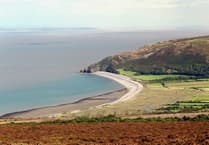PORLOCK could be celebrating a new era for one of its heritage industries if a trial to re-establish oyster farming on its shores is successful. As reported in last week's Free Press, a community-led initiative to develop a shellfish business in the village is now officially underway. The results of a one-year trial to test water quality, nutrient levels and growing conditions, along with a bit of number crunching to determine the financial viability of the project, will decide whether an industry that died out more than 80 years ago could enjoy a renaissance. Around 10,000 seed oysters are now settling in to their new home, strapped to locally produced metal trestles that were put in place on the seabed earlier this year. Within the next few weeks, mussels will also be introduced onto rope-covered large wooden poles. The idea is the brainchild of Porlock Futures, a Porlock Parish Council sponsored group of community and business people who have secured more than £17,000 to launch the project, including £5,000 from the Company of Fishmongers, based at Fishmongers Hall in London, and £10,000 from the Exmoor National Park Authority. Parish council chairman Cllr Alan Wright said the people driving the project were all volunteers but when paid services or labour were needed, the group always looked locally. The metal trestles were made by Allerford Forge and the buoys used to mark the area for navigation charts were sourced nearby. And the area in which the trial is based falls within the Porlock Manor Estate, whose owner Mark Blathwayt has given valuable advice and support to the project. "A key part of the project is the employment opportunities it can bring and what it can do for the local economy," said parish council chairman Cllr Alan Wright. The seed oysters, which have come from Morecambe Bay in Lancashire, are of varying sizes and have been placed in mesh bags. Oysters only grow when they are feeding from nutrients that the sea brings so the trestles are positioned at a level at which for the majority of the time they will be completely submerged. As they grow they will be re-bagged at intervals until they reach marketable size. They will then be removed and go through a decontamination process. Setting up the trial has involved securing licences from a number of organisations. The shellfish have to be acceptable species to avoid damaging the marine environment and monthly testing of water quality and the shellfish will be undertaken to see if the end product is suitable for consumption. "These first ones won't be harvested to eat," said Cllr Wright. "We will just be making sure that the conditions and everything else is right. "At the moment the signs are good and we should know within a few weeks if there are any real problems. "It's a case of fingers crossed but so far so good." If things continue to go according to plan, within 18 months Porlock could be making history by launching Britain's first community sustainable shellfish farm producing oysters and mussels. In the 19th century when oysters were the 'food of the people' it was claimed their discovery in the Bristol Channel saved Porlock from starvation. At that time they were dredged off shore and stored in holding beds on the seashore, the stone wall remains of which can still be seen close to Porlock Weir. The industry died out in the early 20th century, blamed in part on marauding ships from the north east of England who allegedly systematically emptied the oyster beds. But if it can be revived, it could bring a much needed boost to the local economy. If the business proves viable, it would be operated and managed by some form of social enterprise, which would see its benefits ploughed back into local initiatives to benefit the community. "Our goal is not to deliver a multi-million pound business," said Cllr Wright. "Our goal is to create something that will make a difference and that hopefully will be viable." Photos: Somerset Photo News





This article has no comments yet. Be the first to leave a comment.